- Home
- Joy Dettman
Henry’s Daughter Page 2
Henry’s Daughter Read online
Page 2
Lori is staring at those two tourist boys – twin boys. She’s got the dollar gripped in her hand but she’s standing there, mouth open, staring.
It’s them! What the hell are they doing up here?
Ifs and Effs and Stuff
She’s not game to go home. She’s got to tell Mavis and Henry who she saw down at the tourist centre but she can’t tell them because she shouldn’t have been where she was when she saw who she saw, so she’s hiding down at the river in her yowie nest, watching speedboats and the people at the caravan park on the opposite bank.
They’ve got a whole state forest behind them but they’re all crowded in close together, like they’ve lived in the city for so long that they’re plain scared of being free. If she had a caravan she wouldn’t just park it some place and stop; she’d take it all the way to Western Australia and she’d take Henry with her, and when she got there, she’d put her caravan on a boat and take him home to his England. If she was big enough to drive a car and if she had a million dollars in the bank.
If. That word shouldn’t have ever got invented. If I hadn’t wagged school then I wouldn’t have seen them. If someone had remembered my birthday then I wouldn’t have wagged school. If Matty had come out when he was supposed to come out, he would have got born in March and someone would have remembered my birthday. If. If. If. If If. It probably wasn’t invented, probably someone just started saying ‘eff’ one day because they weren’t game to say the proper F-word or they’d get thumped, so ‘eff’ just got turned into ‘if’.
She’s starving hungry. She ate her sandwich too early, ate her wormy apple from Bert Matthews’s tree, ate her muesli bar and she wants to go home and have dinner. But if she goes now she’ll cop it for coming home late, so it’s better if she goes home really late, then Mavis won’t have so much time to get stuck into her.
Her hands cupping her mouth, she lets loose a yodelling scream and on the opposite side of the river faces turn. No one can see her. Her yowie nest is behind a mass of exposed gum tree roots. It’s a good place to hide. Again her war cry goes out across the water and this time it really sounds like a huge, hairy yowie howl.
The river alters sounds. Even the birds sound different down here. She just loves this place, loves this time of day when the dark is getting ready to come down and all the birds are niggly because they want the best branch to roost on, like Greg and Vinnie fighting over who gets to sleep in the top bunk.
By the clock, it’s way past the birds’ bedtime, but the sun won’t leave Australia’s sky tonight and go off to Henry’s England; it’s stuck up there, melted into the blue like a blob of orange bubble gum stuck on the sole of her school shoe.
She’s not wearing her shoes now. They are in her school bag. Bare feet are free. Bare feet run faster, climb trees, write words in the dust, then rub them out again. She writes the F word in the dust then adds ‘birthday’. Writes ‘Lorraine’s’ up the top so it reads, ‘Eff Lorraine’s birthday’.
Lorraine. It’s a horrible old-fashioned name and she hates it. Who else in the whole world is called Lorraine? No one else at school is, or even in the newspapers – except one television lady. She likes Smithy better than Lorraine, likes Lori best of all, because it sounds like a boy’s name. She looks like a boy; most people think she is a boy.
The dust is thick and grey down here. Everything is a bit grey, trees, river, clay, due to Australia is worn out. That’s what Henry says. The tall clay banks of the river are hard as rock and interwoven with tree roots from, like, a million years ago. They’ve probably got dinosaur bones mixed up in those roots because the river banks sure look old enough. Nothing much will grow in them, except gum trees, but their leaves are grey too. The river is pure filthy grey, but that doesn’t stop tourists coming here and messing it up even more with their speedboats. Everyone in town says that those boats are messing up the river but no one stops them doing it.
It’s not safe for swimming, Henry says. He’s wrong about that one; this spot is especially good for swimming, because the water sort of bends around and once you climb down the clay banks, there’s no more dust, just clean sand. Lori’s brothers have always swum at this bend. It’s close to home – just over the road, really, and down a clay track that wanders through the bush for a while. Lori isn’t allowed to come here by herself, but she comes anyway, all the time. It’s her favourite place for thinking and talking to the trees, like Henry talks to his flowers.
He’s not the same as other people’s fathers, he knows pretty much everything. Actually, he probably does know everything, which is because he’s read nearly every book in the Willama library and probably in the Melbourne library as well, and even all the books in the London library, which made his shoulders hunch over through sitting and turning the pages. He’s old enough to be a grandfather, and he’s a pom – or he was until Aunty Eva went over there and brought him back to Australia like a trophy. Mavis says that. She’s only thirty-seven, and Aunty Eva is her sister, and they hate each other like rat poison because Mavis pinched Eva’s husband so Eva pinched Mavis’s twins.
Across the river three tourist kids are paddling a canoe. Lori lets loose a howling yowie yodel, and this time she backs it up with a rain of clods, spraying them over the water, though she can’t make them go right across to the other side; the river is wide here. The kids start looking for her, then when they can’t find her, they row their canoe back to the bank.
Willama has got plenty of water. That’s why the town was first built, and that’s why it grew. Towns don’t grow big unless they’ve got plenty of water and this river has so much that it has to pour some out into a little creek just east of town, then when that little creek has had enough of wandering around the farms behind Willama West and getting itself extra filthy, it finds its way back to the mother river ten kilometres south of the town. Lori has been out to that junction where you can see two different sorts of water moving along, trying hard to stay separate. It’s interesting the way those waters pure refuse to join into one, which is like Eva and Mavis, when you come to think of it.
Lori tosses a few more clods but she can’t scare those tourists into packing up and going home, so she may as well go home and get it over and done with. Except . . . except that this is the beautiful time in the bush when other colours start teasing the grey. She just loves this time, because way up at the top of the trees the sun is already touching them, and it’s got them glowing, like there is red fire in their leaves. Even the water doesn’t look so dirty now, and across the water there are little tourist fires starting up for barbecues and little gas camping lights that look magic amongst the trees. She crawls out of her hide and jumps down to the sand, squinting now to see the tourists.
There is a movement in the patch of water reeds. She steps back, looks at her bare legs and feet. It could be a snake, a black snake, or a tiger snake, which is the worst kind. They love the river and those reed beds; she often sees snakes down here, or sees their tracks in the dust – funny ripply, wriggly lines, like they’re trying to write snake messages to their friends.
She hates snakes. Henry doesn’t. ‘Leave them alone and they’ll leave you alone,’ he says. He’s into leaving things alone, probably because he wants the world to leave him alone. Like even ants and redback spiders, Henry won’t kill. They are all God’s creatures – so he says.
The sun is hanging on tight to those tree tops tonight; it just hates leaving the peace and freedom of this place. Lori understands exactly how that sun feels, but sooner or later it’s going to go and she’s got to go too.
She lives in Willama East, not far from the old cannery, which is not far from the railway line, or the bridge, not too far from the main street or anywhere else really. Willama isn’t like a huge city where you have to catch buses and trams and things. She can walk or run anywhere she wants to go, and she has to run or walk everywhere because she hasn’t got a bike. She thought she might get a bike for Christmas – thought she might get one
for her birthday.
‘Eff Lorraine’s birthday,’ she says and she runs for home up the darkening track, pretending she’s Cathy Freeman and she’s going to win the Olympic Games.
The railway line cuts Willama in half. The East got started on the wrong side of the tracks so it never had a chance to grow proud, Henry says. Tin rooftops get hotter in the East, so hot they almost sizzle some days. Most of the East houses have got tin roofs because most of the houses are old. Most of the dogs are old, and mean too, like Spud Murphy’s dogs that live over the road, right next door to Nelly’s place; they are tied up, all day, every day, and they bark, all day, every day, like they want to get off their chains and eat the whole world alive.
And who’d blame them? Lori wouldn’t – not if they ate Spud Murphy first. He’s a lazy bugger who made his wife do all the hard work, like mow the lawns and take out the green bins, because he had a bad heart, but she died and he didn’t. Now he hasn’t got any wife to torment so he torments his dogs. That’s what Mavis says.
Henry won’t let Mavis get another dog, due to his fence is falling down and he says a new dog will just wander off and get run over like the last two got run over. He used to close the old gate and prop up the fence a bit, but the pickets are mostly rotten and falling over so the gate just stays open now.
Henry’s house got built about a hundred years ago and it was probably an almost posh house back then with its tall roof and its lacy wooden bits between the tops of fancy verandah posts. It had a lattice along the side of the west verandah once too, but the lattice is mostly falling over, like the fence, and the house sort of stands lonely at the end of Dawson Street, sort of ashamed of itself. The verandah boards are pretty much worn out and some of the windows won’t open, the guttering is rusted and the downpipes are mainly down, so when it rains the verandah makes waterfalls all the way around. Poor old house, it looks as if it wants to hide in the bush too, but it just can’t get across that road.
On the other side of the house is Henry’s vacant block where he’s got his chook-pen and his potting shed. That block is worth good money these days and Henry should sell it, Mavis says, and bugger his chooks and his flowers.
When he bought the house, Martin was about seven, which was twelve and a bit years ago. Martin can remember heaps of things, like how Henry and Mavis were going to fix up the roof and paint it, get a new fence to keep the kids and the dog off the street, sell the vacant block and play hell with a broomstick, Martin says. Henry got around to buying a giant bucket of blue paint and putting it in the outside laundry – and it’s still in there. He got around to paying a man to put in a new bathroom and a new stove and hot water system, he got around to fixing up the roof by putting bricks on the loose bits of tin, and that’s about all he got around to, because of Mick getting himself born with a crippled leg that looks like it’s made out of rubber. Mick is number five brother.
Lori has got a pile of brothers – eleven, if you count the twins, who she never counts because they went to live with Aunty Eva when they were two, due to germs and stuff and a long story. Until they were five, Mavis tried all the time to get them back, but she can’t do much about anything nowadays. She can’t even get in a car, can’t even have her babies at the hospital. She’d break the hospital bed.
It’s stupid how Henry keeps letting her have more babies, because every one she has makes her bigger and makes him smaller. It’s true. Every time that milky new-baby smell comes into the house, Mavis needs bigger tent dresses and Henry’s face grows older, his hair goes greyer, he shrinks shorter and his shoulders stoop a bit more.
He wasn’t ever a big man, but he’s got a really huge secret. Lori knows what it is too, but she’s not allowed to tell because Henry said so and Martin said he’d murder her if she told. And what’s the use of having a secret if you can’t tell anyone? The kids at school are always whispering secrets, and Henry’s isn’t a bad one. It’s just about . . . well, it’s partly about him being Australian but growing up in England and going to a posh school so he grew up talking with a plum in his mouth, like Prince Charles, which sounds a bit funny in Willama – unless you’ve got a posh house and about a million dollars in the bank. Henry hasn’t got anything in the bank.
He would have stayed in England if Aunty Eva hadn’t got there just after Henry’s mother died. He was a bit old even then and so was she, so he ended up buying her an engagement ring. It was when he was getting a passport so he could come to Australia and have a big wedding that he found out he was actually born in Australia.
All the way across the oceans, it felt like he was being drawn back to his roots, Henry says. Except adoptions were secret things in those days, so when he got to Melbourne there weren’t any roots for him to find. He found a heap of trouble instead. He found Aunty Alice living in her bungalow out the back of Eva’s place. And he found Mavis. After a bit, Martin accidentally got started, so Mavis and Henry ran off together. They nearly ran off to England, but Mavis got pregnant again and had Donny, then after the first five brothers, they stopped moving around Australia and ended up in Willama.
About two years ago, Henry got an office job at an estate agent’s so he’s finally got superannuation and he says that when he’s sixty-five and retires he’s going to go for a trip and see his homeland one last time, see the age and the green of it, feel the rain of it, see the daffodils and the trees and the softness of a land not ruled by the sun. That’s what he says, and usually at Christmas time. He always gets the wound-up talks at Christmas and no one can shut him up.
He’s got his flowers from England, or from some place that’s not Australia, begonias and orchids and really weird things, and he’s got his songs from England. Nearly every night he sings to his flowers, sings songs no one has ever heard of, like ‘I’ll Take You Home Again, Kathleen’, and ‘My Precious Son’, and ‘Autumn Leaves’. Hundreds of old songs he knows, which have words that tell stories about people dying, and he knows all the words too. He just wanders, waters, fertilises and sings, and his voice sounds truly excellent, and too big to come out of such a skinny, grey little man. His voice is like the only strong part of him that is left.
He’s in the potting shed now, singing his lungs out. Lori is a bit scared to go in there tonight. She’s sort of creeping in slow, while his back is turned, sort of hiding behind that first shelf of pots then sneaking along to the next. He knows she’s there. His head turns, and he smiles his little dry-mouth smile then he licks his lips and sings on.
If he knew she’d wagged it, he wouldn’t be smiling. If he knew who was in Willama tonight he wouldn’t be smiling either. And if Mavis knew, then God help him.
He doesn’t ask why she missed dinner. He probably didn’t notice she missed dinner, which means that Donny didn’t bring a birthday cake home from the supermarket. He doesn’t say happy birthday, doesn’t say anything. If she didn’t love him so much, she’d almost hate him a bit for that.
He’s singing ‘Danny Boy’ and it’s making her feel stuff she doesn’t understand. His voice is as good as those three tenors who get paid millions of dollars to sing at the Opera House, it just hits some special quiver place in her brain that makes shivers of pure ecstasy in her head. He probably would be famous and make heaps of money if he didn’t look so old and if he didn’t only sing in the shed when he watered his flowers.
If.
‘You should get a job singing on the television, Henry,’ Lori says when the song is done. He smiles, sort of shy, which looks funny when the face smiling shy is all wrinkled up. The hose moves on to another pot and he finds a new rhythm as Lori steps nearer.
The shed smells of green things and wet wood and earth. Lori loves that smell, breathes it in deep. It’s a big shed, long and narrow, built by the last owner out of corrugated iron. Before Lori was born Henry paid a man to take the iron off that shed, except the part that’s against Bert Matthews’s fence, then he took the roof off and put on a new one of fibreglass and he made the walls of f
ibreglass and shade cloth so it’s like a glasshouse. But not glass.
The light is fading and Henry, in his faded shirt and rusty old working trousers, is blending into the shadows now so you can barely see him. You can sure hear him. Probably all the neighbours are out watering their gardens so they can get a free concert.
‘Or why don’t you join the music group, like old Clarrie’s daughter asked you to, Henry?’
For a moment his lips try to find an answer, then he shrugs, turns his face to a flower, cups it in his hands and again his voice flows free and strong. ‘I’ll take you home again, Kathleen.’
The sound is even better when you are down the bottom of the shed with the empty pots and junk from the last owner, because it gets trapped, like it’s got no place to get out. Lori walks by him and perches on an upturned pot, listening and looking at an old oval picture frame that’s been here forever. It gets her thinking of other photographs, like the ones of Henry’s English parents. Their names were Daniel and Kathleen Smyth-Owen. He sings all of his songs to them – there is one called ‘Mumma’ and one called ‘Oh, My Papa’. That one has got such beautiful words they make Lori’s heart cry. If she could sing like Henry, she would sing ‘Oh, My Papa’ to him and maybe make him . . . make him be less grey, less small, less sad.
As if. She can’t sing. She’s dumb – she’s dumber than dumb. She can’t even learn her spelling for school, can’t even remember how to spell disappointed.
There is no more light to see the flowers so there is no more singing. Henry rolls up the hose, hangs it on a hook, then together they walk from the shed.

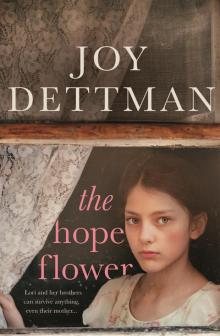 The Hope Flower
The Hope Flower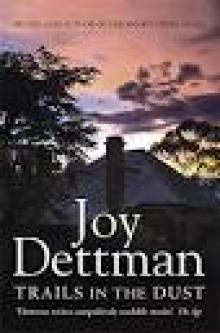 Trails in the Dust
Trails in the Dust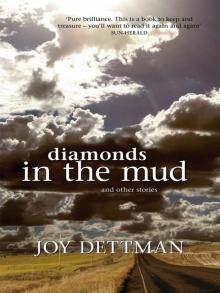 Diamonds in the Mud and Other Stories
Diamonds in the Mud and Other Stories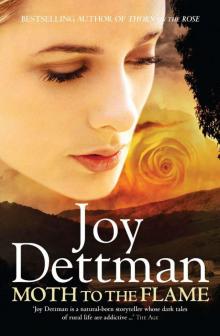 Moth to the Flame
Moth to the Flame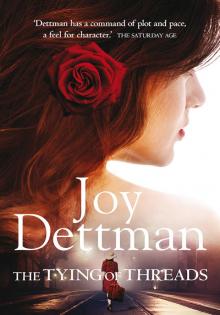 The Tying of Threads
The Tying of Threads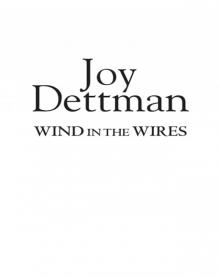 Wind in the Wires
Wind in the Wires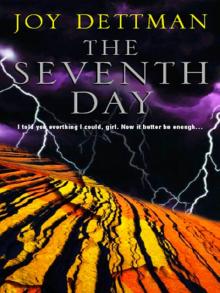 The Seventh Day
The Seventh Day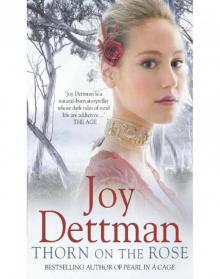 Thorn on the Rose
Thorn on the Rose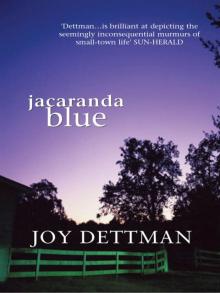 Jacaranda Blue
Jacaranda Blue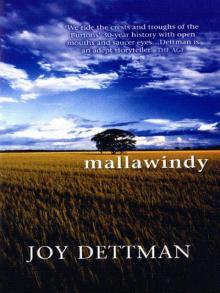 Mallawindy
Mallawindy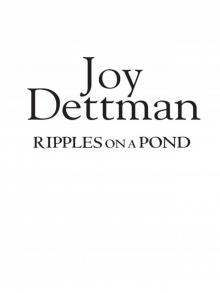 Ripples on a Pond
Ripples on a Pond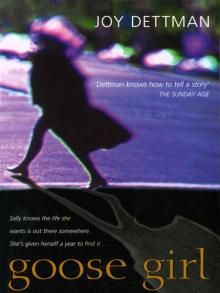 Goose Girl
Goose Girl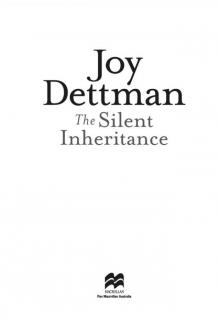 The Silent Inheritance
The Silent Inheritance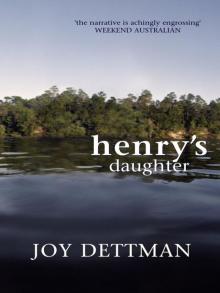 Henry’s Daughter
Henry’s Daughter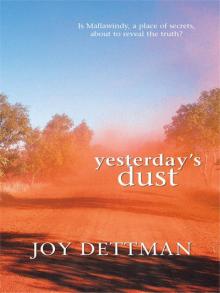 Yesterday's Dust
Yesterday's Dust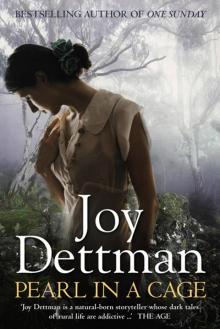 Pearl in a Cage
Pearl in a Cage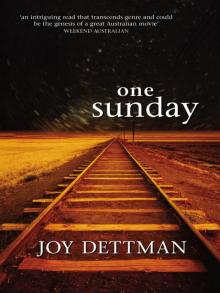 One Sunday
One Sunday